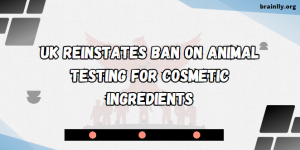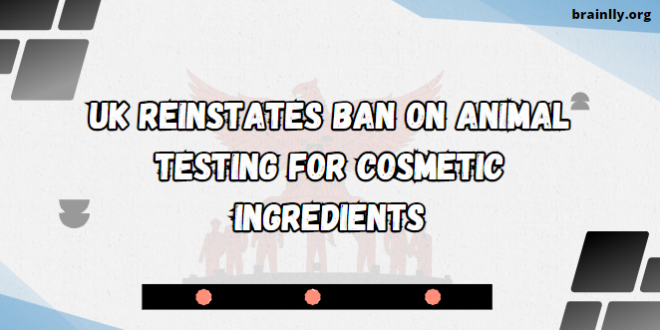In a significant move towards cruelty-free practices, the United Kingdom has reinstated its ban on animal testing for cosmetic ingredients. This decision marks a milestone in the global movement towards ethical and sustainable beauty practices. In this article, we will explore the reasons behind the ban, its implications for the cosmetic industry, and the growing demand for cruelty-free products.
History of Animal Testing
Animal testing has long been a controversial topic within the cosmetic industry. For decades, animals such as rabbits, mice, and guinea pigs have been subjected to painful experiments to test the safety and efficacy of cosmetic ingredients. However, concerns about animal welfare and the availability of alternative testing methods have led to a shift in public opinion.
The EU Ban and Repeal
In 2013, the European Union (EU) implemented a ban on the sale of cosmetic products tested on animals. This ban aimed to encourage the development and use of alternative testing methods and promote the use of cruelty-free products. However, in recent years, there were discussions about the possibility of lifting the ban, which sparked outrage among animal rights activists and consumers.
UK’s Commitment to Cruelty-Free
Recognizing the importance of animal welfare and responding to public concerns, the UK government reinstated the ban on animal testing for cosmetic ingredients. This decision showcases the country’s commitment to ethical practices and aligns with the growing demand for cruelty-free products among consumers.
Alternative Testing Methods
One of the main drivers behind the ban is the development of alternative testing methods that do not involve animals. Scientific advancements have paved the way for innovative techniques such as in vitro testing, computer modeling, and tissue engineering. These methods provide accurate and reliable data on the safety and efficacy of cosmetic ingredients, without the need for animal experimentation.
Consumer Demand for Cruelty-Free Products
Consumers are increasingly concerned about the ethical aspects of the products they use, including their impact on animals. The demand for cruelty-free cosmetics has been steadily rising, with more people opting for brands that are committed to animal welfare. By reinstating the ban, the UK government is addressing the desires and values of its citizens, as well as meeting the expectations of the global market.
Industry Transition to Cruelty-Free
The reinstatement of the ban on animal testing for cosmetic ingredients poses a challenge for the industry. Cosmetic companies will need to adapt their practices and transition towards cruelty-free alternatives. This shift requires investment in research and development of alternative testing methods and the reformulation of products to comply with the new regulations.

Advantages of Cruelty-Free Testing
Aside from the ethical considerations, cruelty-free testing offers several advantages for the cosmetic industry. Firstly, it promotes innovation by encouraging the development of cutting-edge testing methods. Secondly, it enhances the reputation of brands, attracting consumers who value animal welfare. Lastly, it aligns with global trends and positions companies at the forefront of the cruelty-free movement.
International Impact
The reinstatement of the ban by the UK has significant implications beyond its borders. As a global hub for cosmetic products, the UK’s decision sends a powerful message to other countries and encourages them to reevaluate their own animal testing policies. It sets a precedent and contributes to the ongoing international efforts to eliminate animal testing in the cosmetics industry.
Supporting Research and Development
With the ban on animal testing, there will be an increased focus on supporting research and development of alternative testing methods. Governments, organizations, and companies will collaborate to advance scientific innovations that ensure the safety of cosmetic ingredients without compromising animal welfare. This investment will drive progress and lead to more effective and reliable testing techniques.
Educating Consumers
Another important aspect of the ban is the need to educate consumers about cruelty-free practices. Transparent labeling and clear communication will play a crucial role in helping consumers make informed choices. By providing information about the testing methods used and highlighting cruelty-free certifications, companies can empower consumers to support ethical brands.
Conclusion
The reinstatement of the ban on animal testing for cosmetic ingredients in the UK marks a significant step towards a cruelty-free beauty industry. It reflects the growing global awareness of animal welfare and the demand for ethical products. The move also underscores the industry’s commitment to innovation and scientific progress in developing alternative testing methods. As consumers continue to prioritize cruelty-free options, it is imperative for companies to embrace this shift and work towards a more compassionate and sustainable future.
Until Next Time
Thank you for reading this article on the reinstatement of the ban on animal testing for cosmetic ingredients in the UK. We hope you found it insightful and thought-provoking. Stay tuned for more engaging articles in the future. Goodbye and see you again in our next fascinating piece!
 Brainlly A collection of the latest news and information from various trusted sources
Brainlly A collection of the latest news and information from various trusted sources
